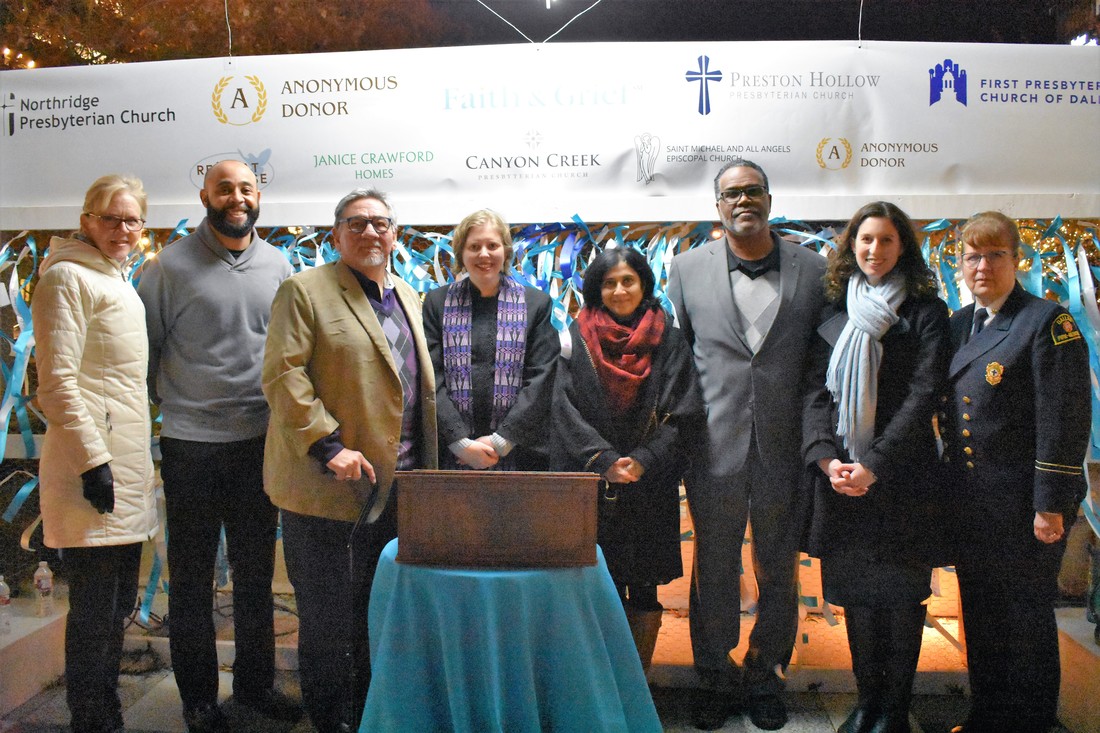|
by Rabbi Shira Wallach On Monday night, I participated in the Faith and Grief Ministries Multi-Faith Service of Comfort at Klyde Warren Park, an annual gathering of people who wish to pay homage to loved ones around the holiday season. The organizers of the service asked me to reflect on the aftermath of the Pittsburgh shooting and how we keep our faith intact after tragedy. I wanted to share my remarks with you: I was asked to speak to you all tonight in the wake of the painful and terrible shooting at the Tree of Life Synagogue in Pittsburgh, just over a month ago, when eleven of our sisters and brothers were murdered in cold blood. They were not engaged in violent protest, only in the sacred and peaceful endeavor of building holy community, building a space in which God’s presence could be felt and praised.
And as you know, the aftermath of such a chillul hashem—as we say in Hebrew—a desecration of God’s name—sent us reeling. For both Jewish communities and other communities of faith, we rely on our sanctuaries to shelter us from cruelty and persecution. It would not even occur to many of us that someone could be so contorted by their hatred that they would seek out such a peaceful and nonthreatening place of attack. How do we recover from something like this with our faith intact? First: we must not give in to fear. We must not let the darkness permeate fully. Though it is perilous, we must continue to build our world with light and lovingkindness, we must continue to heal its brokenness. We simply cannot do this if we refuse to leave our homes. Second: we must not become desensitized. We must not accept newly rising levels of hate crimes and bigoted rhetoric. Though it prevents our wounds from healing completely, we must stay vulnerable, we must remain vigilant. We must remind one another that we cannot stand idly by as our faith communities and other minorities are marginalized and demonized. And third: we must not believe that this is somehow part of God’s plan. For those who explain the unexplainable by insisting that we, mere mortals, can never understand the great mysteries of the divine—well I just can’t abide by that. I can’t believe in a God who would ordain such terrible suffering—both for the families of these victims and for members of faith communities worldwide. Rather, my Judaism teaches me about divine empathy. That when our hearts are broken, so too is God’s. That when our bodies quake with uncontrollable sobbing, that God’s weeping fills the heavens. God loves us and tenderly created us so that God would not be alone in the universe; it is anathema to the foundation of our relationship that God would want us to suffer so. In times of great darkness, we turn to Psalm 23, an extraordinary image of God as shepherd. And why a shepherd? A shepherd understands the needs of his flock, a shepherd remains aware of the emotional realities of her community. The sweet and pastoral presence of a shepherd does not demand that his followers move on before they’re ready, but instead, allows them to remain in the valley of the shadow of death as long as it takes for them to begin putting one foot in front of the other once again. And when the flock finally emerges from the darkness, God helps them find footing on the other side of the valley, the place where the moss is soft underfoot and the sun’s rays gently begin to warm their countenances. And then, the psalm tells us: You set a banquet before me, in the presence of my enemies. You anoint my head with oil, my cup overflows. Notice that the enemies are still present, though God prepares a divine meal for us. We understand that forces of evil can never be completely eradicated, but that truth cannot paralyze us. Even though danger and darkness remain present, we can still strengthen our bonds with God and with one another, as we work together to bring more light into our lives. We can choose to immerse ourselves in the great gifts of God’s comfort—and this only intensifies our pledge to tikkun olam, repairing our world. The psalm ends with the prayer: Surely, goodness and kindness shall follow me all the days of my life, and I shall dwell in the house of Adonai forever. Despite our experience of the darkness—even because of it—we redouble our dedication to the central tenets of our faith. We believe in the enduring strength of mercy, lovingkindness, and human dignity, and we know that there is no darkness that contains the power to erase the truth and eternality of those ideals. May all those whom we have come here to mourn tonight continue to illuminate our paths forward, and may God give us the strength to elevate their memories as we fill our world with light and love. Amen. Delivered Monday, December 3, 2018
2 Comments
Diane Benjamin
12/6/2018 03:19:30 pm
Loved your message...however, why aren't you consistent with "In times of great darkness, we turn to Psalm 23, an extraordinary image of God as shepherd. And why a shepherd? A shepherd understands the needs of his flock, a shepherd remains aware of the emotional realities of her community. " Are you implying that G-d, the Shepherd is either/or him or her? Just asking.....
Reply
Shira Wallach
12/6/2018 03:48:48 pm
I'm so glad you asked! Yes, that is exactly what I'm saying.
Reply
Leave a Reply. |
Details
AuthorsShearith Israel clergy, staff and congregants share Archives
April 2023
Categories
All
|


 RSS Feed
RSS Feed